 MyDogBreeds
MyDogBreeds Miniature Siberian Husky is originated from United States but Boxer is originated from Germany. Miniature Siberian Husky may grow 24 cm / 9 inches shorter than Boxer. Miniature Siberian Husky may weigh 21 kg / 46 pounds lesser than Boxer. Both Miniature Siberian Husky and Boxer has almost same life span. Miniature Siberian Husky may have less litter size than Boxer. Miniature Siberian Husky requires Moderate maintenance. But Boxer requires Low maintenance
Miniature Siberian Husky is originated from United States but Boxer is originated from Germany. Miniature Siberian Husky may grow 24 cm / 9 inches shorter than Boxer. Miniature Siberian Husky may weigh 21 kg / 46 pounds lesser than Boxer. Both Miniature Siberian Husky and Boxer has almost same life span. Miniature Siberian Husky may have less litter size than Boxer. Miniature Siberian Husky requires Moderate maintenance. But Boxer requires Low maintenance
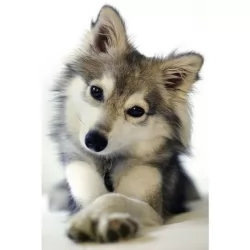 Miniature Siberian Huskies – also known as mini huskies – are your regular Siberian husky bred to be that much smaller than what the breed standard dictates.
Miniature Siberian Huskies – also known as mini huskies – are your regular Siberian husky bred to be that much smaller than what the breed standard dictates.
They’re sought after by those who love the regular sized Siberian Husky but who find the larger dog too large and boisterous. They come complete with the looks and the temperament of the Siberian Husky but they are smaller.
The origins of these gorgeous Mini huskies is conflicting though as some believe they originated in the USA. The name of Bree Normandin is bandied about when talking of the breed’s origin while other refer to Linda S. Spurlin from Alaska. She became interested in them when her full-sized husky became pregnant by a small dog.
Spurlin used Siberian and Alaskan Huskies as well as small Schipperkes and American Eskimo Dogs to bring about the mini version. They’ve got the same pedigree as the Siberian Husky, but it has been selectively bred for its smaller size, also coming from the Spitz family of dogs.
The Miniature Husky is genetically the same as the larger Siberian Husky and the AKC doesn’t recognize it as a separate breed, but sees it as a different size variation of the working-group Siberian Husky.
 In the late 19th century boxer was developed in Germany. It is a part of the Molosser dog group. The breed Brabanter Bullenbeisser is said to be the ancestor of the Boxer. He got the name Boxer as he stands with his back legs and does like a boxer do. In 1895 the breed came to a dog show by three germans named Friedrich Robert, Elard Konig and Hopner. In 1896 they founded the first boxer club as Deutscher Boxer Club. In 1902 the first Boxer breed standard was published by the club. The breed was introduced to United States in 20th century. The boxer involved in military work and also worked as a messenger dog. After 2nd world war they became popular as the soldiers brought them and introduced.
In the late 19th century boxer was developed in Germany. It is a part of the Molosser dog group. The breed Brabanter Bullenbeisser is said to be the ancestor of the Boxer. He got the name Boxer as he stands with his back legs and does like a boxer do. In 1895 the breed came to a dog show by three germans named Friedrich Robert, Elard Konig and Hopner. In 1896 they founded the first boxer club as Deutscher Boxer Club. In 1902 the first Boxer breed standard was published by the club. The breed was introduced to United States in 20th century. The boxer involved in military work and also worked as a messenger dog. After 2nd world war they became popular as the soldiers brought them and introduced.
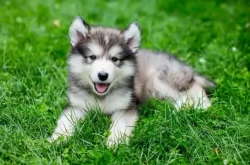 Known also as the Alaskan Klee Klai,the Miniature Siberian Husky stands at 33-39cm in height and weighs between 8 - 11kg.
Known also as the Alaskan Klee Klai,the Miniature Siberian Husky stands at 33-39cm in height and weighs between 8 - 11kg.
These mini huskies are like the larger huskies and can also come in a range of color variations such as grey and white, black and white or red and white for instance. In typical Spitz dog fashion they have the erect ears and long bushy tail. A striking feature of these dogs is the beautiful eyes – they can be brown but also a mesmerising blue.
This Miniature Siberian Husky is an intelligent dog and you’re not going to have any trouble with him teaching him some basic commands such as sit, lie-down and stay.
You need to know that these dogs aren’t going to be content lying around all day and that they want to be kept busy almost around the clock. They have always been working dogs so he will need plenty of mental – and physical exercise to keep him content. A bored, frustrated Mini Husky will just develop problem behavior through no fault of his own. People who buy high energy dogs have a responsibility towards them to keep them busy and well exercised.
These dogs are similar to their genetic ancestor, the wolf, and instead of barking, you may find him trying to communicate with a howl. One thing is sure, they make great family pets, and their gentle nature allows them to get on well with children and also not to show aggression with other dogs. They’re loyal, outgoing and charming.
 Boxer is a breed which is medium in size and has short hair. They have very strong jaws as to hunt large prey even hanging on biting them. It belongs to the working group. Boxers are well known for their love and faithfullness. Also he is very intelligent and its cleanliness makes him to be good dog for home. They are very energetic and are playful in nature. When boxers where trained by giving reward to them it is sure that they will perform its best. Normally they like to have good companionship with humans and smaller dogs.
Boxer is a breed which is medium in size and has short hair. They have very strong jaws as to hunt large prey even hanging on biting them. It belongs to the working group. Boxers are well known for their love and faithfullness. Also he is very intelligent and its cleanliness makes him to be good dog for home. They are very energetic and are playful in nature. When boxers where trained by giving reward to them it is sure that they will perform its best. Normally they like to have good companionship with humans and smaller dogs.
They are incredible in their alertness and well suitable for watchdog. Boxers will be playful and silly till 3 years as they will mature after that only. They require only a minimum amount of grooming. They are suitable for apartment living until they are with their owners. Boxer owners will be sure to enjoy its clownish behaviour. They will be excited many time and show that by spinning in circles and making a sound which the owner will understand that he is happy or he needs some thing which is in the hands of his owner.
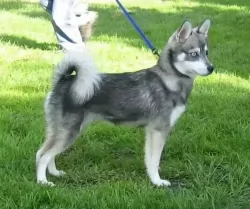 Your cuddly Mini Siberian Husky is such an intelligent dog, active and social and guaranteed to make you a splendid pet.
Your cuddly Mini Siberian Husky is such an intelligent dog, active and social and guaranteed to make you a splendid pet.
Being somewhat wary and aloof with strangers, they also make good watchdogs. They do well with children who have been taught to be kind and gentle with animals.
With good care your dog can reach up to 15 years of age, providing you with many years of superb friendship.
 They are good kid friendly dogs. He is famous for his alertness and thus a wonderful watchdog. He loves to play with children. The nature of dog varies according to the heredity and society. The temperaments of the parents will effect in the puppy. Boxer is a friendly companion and loves to be with its family all the time and play with them.
They are good kid friendly dogs. He is famous for his alertness and thus a wonderful watchdog. He loves to play with children. The nature of dog varies according to the heredity and society. The temperaments of the parents will effect in the puppy. Boxer is a friendly companion and loves to be with its family all the time and play with them.
Boxers are good for apartment living provided they are taken for a walk and exercised daily. It will be good if anyone stays with him always since he doesn't like being alone. He should be taken out only in a moderate weather as both hot and cold weather cannot be tolerated by him. He will suffer a lot in hot weather when compared with cold.
Training is necessary for them to refreshed physically and mentally. Boxer is a quick learner and rewarding them will make them more interested in doing it. Training should be started from basic commands like sit, stay and come. Boxer should be trained to not jump on visitors who come. They are very energetic and powerful and are eager to learn if properly taught.
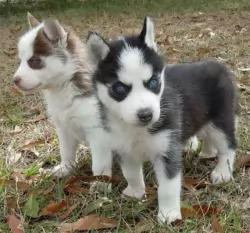 Your Miniature Siberian Husky is a healthy dog and you won’t have to spend too much money on him at the vet. However, just like with any other dog, he can battle with some of the common dog diseases -
Your Miniature Siberian Husky is a healthy dog and you won’t have to spend too much money on him at the vet. However, just like with any other dog, he can battle with some of the common dog diseases -
This eye problem affects about 10% of all Siberian Huskies and its not limited to old dogs. Juvenile cataracts can affect young dogs too. Luckily the problem isn’t painful for the dog.
Skin problems can be a concern for the Mini Siberian Husky, especially as one is used to seeing these dogs with thick coats. Follicular dysplasia is a genetic condition that causes patchy hair loss as well as a scaly, infected skin.
Check out that your dog is receiving nutritious food with vitamins and minerals as a zinc deficiency for instance can cause hair loss as well as skin problems.
 The major health problems Boxers get includes Cancer, heart problems such as Aortic stenosis, Gastric dilatation and intestinal problems. Infection is the major problem in puppies. Boxers are also in a risk of getting degenerative myelopathy which is a neurologic problem. Allergies and skin problems are also a problem in them. It is difficult to recognize a growing puppy to be free from all diseases and the only thing we can do is to buy the puppy from a reputable breeder.
The major health problems Boxers get includes Cancer, heart problems such as Aortic stenosis, Gastric dilatation and intestinal problems. Infection is the major problem in puppies. Boxers are also in a risk of getting degenerative myelopathy which is a neurologic problem. Allergies and skin problems are also a problem in them. It is difficult to recognize a growing puppy to be free from all diseases and the only thing we can do is to buy the puppy from a reputable breeder.
Boxers may lose their hair due to some diseases and conditions. When some materials such as nickel, rubber and wool are accidentally touched by them it may cause allergies and hairfall follows it. Some auto immune disorders leads to hairfall. Due to some inhalation of pollen or house dust the problem may happen. Some bacterial infection and hormonal problems may also leads to hairfall.
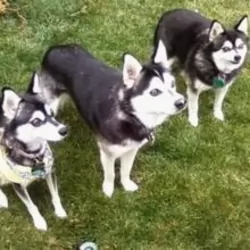 The Miniature Husky is an active and energetic breed that is going to require a lot of exercise. He is able to adapt to life in the city or the countryside but wherever you keep him as a pet, he will require regular daily exercise.
The Miniature Husky is an active and energetic breed that is going to require a lot of exercise. He is able to adapt to life in the city or the countryside but wherever you keep him as a pet, he will require regular daily exercise.
These dogs are used to cold climates so make sure your Mini Siberian Husky doesn’t overheat. Make sure that when he’s outdoors, there is shade for him and a water bowl. You’ll be doing him a real favor if you provide him with a small paddling pool to dip into on a hot day.
These are clean, odorless dogs that actually require little human help to be groomed. You can give your dog a good brush twice a week.
Mini Siberian Huskies, like the larger breed, have a high metabolism, so small amounts of highly nutritious food will do well with them. If you intend feeding your one commercially manufactured food, make sure its the high quality food that comes with plenty of minerals and vitamins. Try and avoid the low quality brands that come packed with unhealthy preservatives and colorants.
Dogs do well on simple, nutritious diets, so some boiled chicken, brown rice and raw and cooked vegetables such as carrots, potatoes and spinach added into the dry kibble from time to time will do him wonders.
Also try and include some raw meat into the kibble from time to time. That's it, as simple as that- no exotic, spicy foods and foods which we humans eat such as nuts, chips and chocolate – all can be toxic for your pet and just give him an upset stomach.
Make sure fresh, cool water is constantly available.
 Normally puppies require more food than adults to meet their energy requirement for growth. They should be fed in a correct time interval. The puppy food for large dogs must be chosen for their health. Boxer puppies must be fed twice in a day and two cups of food will be better for them for one time. Upto 6 months this method is recommended. Feeding them by dividing the meals into smaller portion will be good since they will eat too much and very fast. Weight of the puppy should be checked regularly and food should be given according to that.
Normally puppies require more food than adults to meet their energy requirement for growth. They should be fed in a correct time interval. The puppy food for large dogs must be chosen for their health. Boxer puppies must be fed twice in a day and two cups of food will be better for them for one time. Upto 6 months this method is recommended. Feeding them by dividing the meals into smaller portion will be good since they will eat too much and very fast. Weight of the puppy should be checked regularly and food should be given according to that.
The food given to the boxer will effect in the dog's health and its life span too. Also it should match our budget also. Overfeeding will make them overweight and thus bringing harm to them. It is recommended to feed boxer two times a day to avoid bloat. Food should be given such that the dog completely eats it and if they can't eat completely then the balance food must be thrown away to avoid over eating. They should not be given food while we eat even once as it will develop begging behaviour in them.
Boxers are not suitable for living in outdoors, since they have short coats and short noses. But they like to play in a fenced yard. It is recommended to make them walk for half an hour twice a day. Playing flyball with them will make them happy and making him exercised will give him a good behaviour.